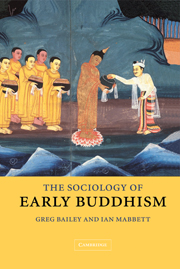Book contents
- Frontmatter
- Contents
- Acknowledgements
- List of abbreviations
- Introduction
- 1 The problem: asceticism and urban life
- CONTEXT
- 2 The social elite
- 3 Economic conditions
- 4 Urbanization, urbanism and the development of large-scale political structures
- 5 Brahmins and other competitors
- 6 Folk religion and cosmology: meeting of two thought worlds
- MEDIATION
- Conclusion
- Bibliography
- Index
4 - Urbanization, urbanism and the development of large-scale political structures
Published online by Cambridge University Press: 22 September 2009
- Frontmatter
- Contents
- Acknowledgements
- List of abbreviations
- Introduction
- 1 The problem: asceticism and urban life
- CONTEXT
- 2 The social elite
- 3 Economic conditions
- 4 Urbanization, urbanism and the development of large-scale political structures
- 5 Brahmins and other competitors
- 6 Folk religion and cosmology: meeting of two thought worlds
- MEDIATION
- Conclusion
- Bibliography
- Index
Summary
Society and economy in the Buddhist texts are still dominated by a physical (and conceptual) landscape where the contrast between village and forest is pronounced in a geographical sense and not just in an ideological sense as it is in the Brāḥmaṇa texts. But it is much more than a question of village. The universal quality of landscape given by early Buddhist texts is that of urbanism, of cities sufficient in size to have harboured large populations who did not derive their income from agriculture. Such cities were surrounded by small villages and lots of open space, both wooded and cultivated. Buddhist monks did not have to make a decision between accepting urbanization as a process, the presence of large political states as a reality, or not accepting them. Both were realities when Buddhism developed. We presume they did not have an attitude to it as a process of landscape change and as a conceptual frame for particular forms of behaviour, because through their habitual touring the monks must have witnessed a wide variety of landscapes and forms of habitation. Not that all monks or nuns came from large towns or cities, but there was not a repressed memory of a sharp break between an urban and a non-urban landscape, even if there remained in both Buddhist and brāhmaṇical thought a sharp conceptual (and physical) distinction between village and forest.
- Type
- Chapter
- Information
- The Sociology of Early Buddhism , pp. 77 - 107Publisher: Cambridge University PressPrint publication year: 2003



